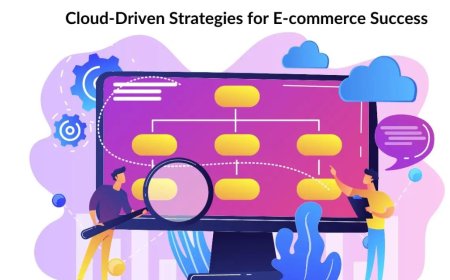Skills Required to Become a Cloud Engineer
Explore the essential skills required to become a successful cloud engineer. Gain expertise in key areas for a rewarding career in cloud computing.

Many people and companies are using cloud technology as opposed to keeping files on their personal computers. This change is happening everywhere and there is a big demand for skilled professionals who can manage the technical side of things. These professionals, called cloud engineers, are important because businesses want to use the cloud to make their operations smoother. As the digital world keeps changing, the need for experts who can handle cloud infrastructure is getting bigger and more important.
Getting into cloud engineering can feel like trying to find your way through a maze without a clear map. With the demand for cloud engineers increasing rapidly, newcomers often face a common problem: What do I need to know to succeed in this field that is constantly changing? To make things easier, let's explore the basic skills that are important for anyone who wants to have a successful career in cloud engineering. Tech giants like Amazon, Google, IBM, and Microsoft are hugely investing in their cloud infrastructure and are hiring cloud engineers and experts from all over the world. The quick advancement of cloud technology has given rise to flexibility, profits, and scalability. This has resulted in attracting more and more researchers, scholars, engineers, computer scientists, and practitioners.
What is a Cloud Engineer?
A cloud engineer is an IT professional who is responsible for all the technological duties which are associated with cloud computing, such as maintenance, planning, support, design, and management. However, cloud engineer is a general term and they are further divided into:
-
Cloud Software Engineer
-
Cloud System Engineer
-
Cloud Network Engineer
-
Cloud Security Engineer
-
Cloud Architect
Every position has a specific role to play in cloud computing and they’re hired by companies to look after deploying cloud services, understanding their cloud technologies, and scaling up their cloud resources.
Why Learn Cloud Computing?
Before you proceed with your cloud journey, it is important to have a clear reason for why you want to learn about it. What is the motivation behind businesses and companies shifting towards the cloud?
A lot of people jump into the cloud and learn services and stuff without getting the fundamentals clear, this can lead to poor basic understanding and therefore is not recommended. Since cloud requires extreme persistence and grit as it is an advanced topic, you need to have a clear goal and a strong motivation behind it. One reason could be that it has been completely adopted by leading tech companies and hence will have an ever-growing market for the next decade at least. Another reason could be that cloud engineers are paid a good amount depending on their expertise and years of experience.
How To Become a Cloud Engineer?
There are many resources available to learn about cloud computing, such as certifications, official documentation, blog posts, and YouTube videos. With so many options, it can be overwhelming to choose the right course to become a skilled cloud engineer. Amazon Web Services and Google Cloud Platform have partnered with online learning platforms like Coursera to offer courses and certifications that are highly valuable for job applications. Microsoft also provides cloud courses through Udacity nanodegree programs, sometimes offering scholarships for students. These courses are taught by experts who work in these companies, providing valuable insights into how cloud technology is used within organizations. Learning directly from these experts can be very beneficial.
What are the basic skills that aspiring cloud engineers need to develop to excel in their roles?
Skills You Should Master to Become a Cloud Engineer
Foundational Knowledge of Cloud Platforms:
Starting the exciting journey to become a cloud engineer begins with building a strong foundation in major cloud platforms like Amazon Web Services (AWS), Microsoft Azure, and Google Cloud Platform. These platforms are like playgrounds where all the cloud action happens. To succeed in this space, it's important to understand the rules and have a good grasp of these platforms.
Think of AWS, Azure, and Google Cloud as big toolboxes. Each toolbox has its own unique tools, and as a cloud engineer, you want to be the expert who knows how to use every tool in each box. While AWS and Azure may have different-looking hammers, the basic concept of using them to hit a nail is the same.
Well, these platforms are like the backstage managers of the cloud show. They help you create, organize, and manage everything in the cloud – from storing data to running applications. Being proficient in these platforms is like having a magical control panel that allows you to shape the cloud according to your needs.
Networking Fundamentals for Cloud Engineers
-
Protocols: Protocols are like languages that devices in a network use to communicate. Cloud engineers need to understand protocols such as TCP/IP to enable reliable communication within the cloud. It's like providing that everyone at a party speaks the same language.
-
IP Addressing: IP addresses are unique street addresses for devices in a network. Cloud engineers must know how to assign and manage these addresses to ensure accurate data delivery. It's like making sure the right package reaches the correct doorstep.
-
Security Measures: Just as we secure our homes, cloud architects implement measures to protect data in transit. Cloud engineers should be familiar with concepts like firewalls and encryption to verify data confidentiality and safety as it travels through the cloud. Security acts as the protector of the online highway.
-
Subnetting: Subnetting is like dividing a large neighborhood into smaller blocks. Cloud engineers use subnetting to efficiently organize and manage IP addresses. It's about creating order in the virtual community to provide smooth and organized communication.
-
Routing: Routing is like the GPS of the internet. Cloud engineers need to understand how data moves through the network. It's like planning the best route for a delivery truck, providing data that takes the most efficient path to its destination.
Virtualization
Virtualization in cloud engineering is like using a magic wand to create multiple copies of your computer on one device. It tricks your computer into thinking it's many computers, helping cloud engineers manage resources efficiently. It's like having a pizza that can magically turn into as many slices as needed, providing that everyone gets their fair share without running out. Virtualization allows cloud engineers to optimize resources and make things scalable, just like adjusting the size of a pizza based on hunger levels. It's like having a secret code to make everything in the cloud run smoothly.
Scripting and Automation Skills
Learning Python or PowerShell can make a big difference for cloud engineers. It's like having a magic wand that can do repetitive tasks for you, making your job easier. As opposed to repeatedly performing the same actions, you can teach your computer to do them for you! This saves time and reduces mistakes, making your cloud management more efficient. It's like having a helpful assistant that follows your instructions to keep everything in your cloud organized and running smoothly. So, if you're getting into cloud engineering, learn Python or PowerShell – they're your secret weapons for an easy cloud experience!
Security Expertise
Keeping important information safe is very important for cloud engineers. They are like superheroes who protect sensitive data from bad guys. They use encryption to make data unreadable to people who shouldn't see it. They also use Identity and Access Management (IAM) to control who can access the data. It's like having a bouncer at a party who decides who can come in and what they can do. It's important to follow security rules to keep everything safe, like locking doors and windows at home to keep intruders out. Cloud engineers must make sure only the right people can access the data and keep it in a secure place.
Containerization Knowledge
Containerization, using tools like Docker and Kubernetes, plays an important role in how we handle applications in the cloud. Think of containers as portable boxes that include everything an application needs to run smoothly - its code, libraries, and settings. Docker helps create and manage these containers, making it easier to move applications between different environments without any hiccups.
-
Containerization is important for managing applications in the cloud.
-
Containers are like portable boxes that contain everything an application needs to run smoothly.
-
Docker helps create and manage these containers.
-
Kubernetes is like a traffic controller for containers, ensuring they work together seamlessly.
-
Understanding containerization is like having a superpower for cloud engineers.
-
Containerization simplifies the process of deploying, scaling, and updating applications.
Problem-Solving and Troubleshooting Skills
Cloud environments are constantly changing and can present difficulties. Cloud engineers need to have excellent problem-solving abilities in order to quickly and effectively resolve issues, reducing any periods of system unavailability and ensuring the best possible performance.
-
Cloud engineers are like explorers in the world of cloud computing, facing the challenge of constantly changing environments.
-
They are problem-solving powerful, using their detective skills to quickly identify and fix issues.
-
Their main goal is to minimize downtime, changing that websites and services run smoothly.
-
Cloud engineers are like online firefighters, always ready to solve technical problems and keep the online world operational.
Collaboration and Communication Skills:
In cloud engineering, it's important to work and talk together. If you're building something cool in the cloud with a team, not everyone will speak the same technical language. That's where good communication skills come in handy! Cloud engineers don't just talk tech with other techies. They work with people from different areas, like marketing or sales, who may not know all the technical details. It's like being a tech translator. You take the challenging technical language and make it simple for everyone to understand. Being good at this helps the whole team work well together. You're the bridge between the tech world and the rest of the team. This way, everyone knows the goals and works together to make amazing things happen in the cloud!
Continuous Learning and Adaptability
The cloud environment can be compared to a puzzle that is constantly receiving new pieces. Cloud engineers must continuously learn about these new pieces, such as new tools, different methods, or fresh ideas, in order to solve the puzzle. It's similar to always being prepared to upgrade your powerful gear. Being adaptable is like having a power that allows you to easily adapt to these changes. Therefore, for those aspiring to become cloud engineers, staying curious and open to new ideas is the key factor in mastering the ever-changing world of the cloud.
To become a proficient cloud engineer, you need to have different skills. This includes understanding cloud platforms and being committed to continuous learning. Succeeding in cloud engineering requires dedication and a strategic approach. Aspiring cloud engineers who develop these essential skills will be well-prepared to change the complicated world of cloud computing and contribute to the digital transformation of organizations worldwide.






























































